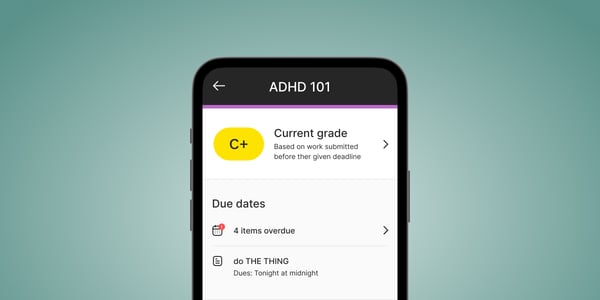Do you ever think about that time you failed a take-home midterm for your Organic Chemistry class because you waited until the night before it was due to even look at it?
Oh – just me?
If you have ADHD, you may struggle with meeting deadlines. And it’s not because you’re lazy or that you don't care. There’s a lot more going on inside your brain that can make deadlines feel impossible to meet.
Too long; didn’t read
- If you’re human, you probably aren’t a fan of deadlines. If you have ADHD, you probably struggle with deadlines more than anyone you know.
- There are five reasons why this is true, including perfectionism, overcommitment, and procrastination.
- There are also five ways to overcome challenges associated with deadlines, including TikTok (kind of) and The 70% Rule.
Why are deadlines so daunting?
Ask any adult how they feel about impending deadlines—I guarantee that most responses will include the words “anxious”, “despise”, or “oh no! That reminds me!”
In other words, we can all agree that deadlines are daunting. This is especially true for ADHD brains; they’re more likely to have emotional overreactions to deadlines, or miss them altogether.
Everyone is unique, but here are 5 common reasons why it’s so hard for people with ADHD (and neurotypicals sometimes, too!) to meet deadlines:
1. Procrastination
Ah, procrastination - the bane of the ADHD brain’s existence.
People with ADHD procrastinate because we struggle with task initiation, task-switching, and task completion. (The worst combo, if you ask me.)
While procrastination itself isn’t an ADHD symptom, it is the outcome of a common neurodiverse challenge: executive dysfunction. Because it’s hard for us to start new tasks and self-motivate, it can be challenging for ADHDers to get things done on time.
🔑 Key takeaway: Procrastination isn’t a symptom of ADHD, but a result of executive functioning problems.
2. Lack of motivation
Motivation is strongly regulated by dopamine, a neurotransmitter involved in the brain’s pleasure and reward center. I.e., whenever something happens that makes us feel good or accomplished, dopamine is always there.
So, what’s the problem?
It’s believed that people with ADHD lack sufficient dopamine or dopamine transporters1, which complicates our self-motivation skills. We struggle to do the thing even when we know there’s a reward waiting at the end (e.g. not failing your midterm.)
🔑 Key takeaway: A lack of urgency surrounding the deadline leaves us unmotivated to seek out the reward. Due later? Do later.
3. Overcommitment and overwhelm
Overwhelm comes from many things, but deadline overwhelm often comes from overcommitment, which shows up in two ways:
- Saying “yes” to more responsibilities because we “don't want to let anyone down” (this people-pleasing behavior often comes from rejection sensitive dysphoria, or RSD)
- Impulsively committing without considering the deadline because we got a little too excited! (It happens. It’s ok.)
Overcommitment almost always leads to feelings of overwhelm.
And once your brain associates a deadline with that feeling, you’re more likely to subconsciously avoid anything related to the deadline—e.g. the entire important task, e.g. looking at your midterm sooner than the night before the deadline.
🔑 Key takeaway: People-pleasing and impulsivity can cause overcommitment, which causes overwhelm, which causes avoidance, which causes missed deadlines.
4. Time blindness
Dr. George Sachs—clinical director of ADHD management app, Inflow—says people with ADHD have two modes for doing tasks: “now” and “not now”.
This is largely due to time management struggles and time myopia, or “time blindness”. For example, once we’re in hyperfocus mode, what feels like 20 minutes to us is 6 hours in reality. We’ll approach a task thinking it’ll “just take a minute”, only to spend the entire afternoon on it.
The same principle applies to deadlines.
🔑 Key takeaway: ADHDers aren’t the best at estimating how long tasks will take, or how much time they’ve spent on one.
5. Perfectionism
We’ve all been there: with time to spare before the midnight deadline, you quickly proofread one more time before submitting… and before you know it, it’s 1:30 am and you failed your midterm.
While this example is coupled with #4 (time blindness), perfectionism can negatively affect our ability to meet deadlines all on its own. This typically comes from sensitivity to rejection.
ADHDers are prone to rejection sensitivity from a young age2, which conditions us to fear failure and embarrassment as adults. To (over)compensate, we try to predict our shortcomings, and attempt to fix our mistakes before anyone even sees them as “mistakes”.
🔑 Key takeaway: Rejection sensitivity can cause hypervigilance to failure and humiliation. Over time, we become perfectionists, making it harder to meet deadlines.
How to meet deadlines when you have ADHD
Now that you know 5 big reasons for struggling with deadlines, you’re ready for these 5 relevant tips to help you overcome each of those challenges.
1. Chunking > procrastination
“Chunking” is just a way to say “breaking down large tasks into smaller, more manageable ones.”
Instead of viewing the deadline as one big project, view it as a bunch of smaller projects.
💡 Pro tip! Pretend you’re delegating tasks to others. If you had six people to help you, how would you divide the work amongst them? Now, use that delegation as your chunking guide.
2. Treat yo’self to get motivated
With motivation, it’s important to include rewards whenever possible—especially if you have ADHD. Rewards don’t need to be extravagant, nor do they have to be tangible or immediate. They just need to be something that makes you feel good.
💡 Pro tip! Spread out your rewards so that the next reward is always right around the corner (i.e. 15 minutes of TikTok scroll-time when you finish one more paragraph)
3. Set boundaries to avoid overwhelm
Avoid an overwhelm-shutdown by setting boundaries in different areas of your life. Communicate these boundaries to friends by simply saying “no” when they ask a favor of you around the time you need to meet a deadline.
💡 Pro tip! Being more open about your workload and ADHD challenges can open up an opportunity for others to empathize, or even offer to help.
4. Use visual timers to stay aware of time passing
This one’s self-explanatory—visual timers help you become more aware of the amount of time that passes while working on tasks. Awareness is key for anyone struggling with time blindness. (e.g. everyone with ADHD, probably)
💡 Pro tip! Set the timer for short intervals—10, 15 minutes—and try to get small tasks done in that time. This adds a bit of gamification to your day!
5. Apply the 70% rule to your perfectionist mindset
Give 70% effort, until you absolutely have to give more.
This time management principle came from the idea that people—students, athletes, employees—shouldn’t be expected to put forth their full capacity 100% of the time. Having a perfectionist mindset in a high stress environment, e.g. trying to meet a deadline, will only cause burnout.
💡 Pro tip! (I don’t actually have a pro tip for this one, but the perfectionist in me couldn’t not add one, so this is my 70% effort at a pro tip.)








